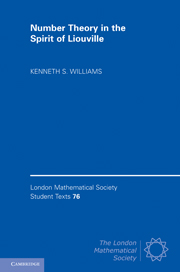Book contents
- Frontmatter
- Contents
- Preface
- Notation
- 1 Joseph Liouville (1809–1882)
- 2 Liouville's Ideas in Number Theory
- 3 The Arithmetic Functions σk(n), σk*(n), dk, m(n) and Fk(n)
- 4 The Equation i2 + jk = n
- 5 An Identity of Liouville
- 6 A Recurrence Relation for σ*(n)
- 7 The Girard-Fermat Theorem
- 8 A Second Identity of Liouville
- 9 Sums of Two, Four and Six Squares
- 10 A Third Identity of Liouville
- 11 Jacobi's Four Squares Formula
- 12 Besge's Formula
- 13 An Identity of Huard, Ou, Spearman and Williams
- 14 Four Elementary Arithmetic Formulae
- 15 Some Twisted Convolution Sums
- 16 Sums of Two, Four, Six and Eight Triangular Numbers
- 17 Sums of integers of the form x2 + xy + y2
- 18 Representations by x2 + y2 + z2 + 2t2, x2 + y2 + 2z2 + 2t2 and x2 + 2y2 + 2z2 + 2t2
- 19 Sums of Eight and Twelve Squares
- 20 Concluding Remarks
- References
- Index
2 - Liouville's Ideas in Number Theory
Published online by Cambridge University Press: 05 May 2013
- Frontmatter
- Contents
- Preface
- Notation
- 1 Joseph Liouville (1809–1882)
- 2 Liouville's Ideas in Number Theory
- 3 The Arithmetic Functions σk(n), σk*(n), dk, m(n) and Fk(n)
- 4 The Equation i2 + jk = n
- 5 An Identity of Liouville
- 6 A Recurrence Relation for σ*(n)
- 7 The Girard-Fermat Theorem
- 8 A Second Identity of Liouville
- 9 Sums of Two, Four and Six Squares
- 10 A Third Identity of Liouville
- 11 Jacobi's Four Squares Formula
- 12 Besge's Formula
- 13 An Identity of Huard, Ou, Spearman and Williams
- 14 Four Elementary Arithmetic Formulae
- 15 Some Twisted Convolution Sums
- 16 Sums of Two, Four, Six and Eight Triangular Numbers
- 17 Sums of integers of the form x2 + xy + y2
- 18 Representations by x2 + y2 + z2 + 2t2, x2 + y2 + 2z2 + 2t2 and x2 + 2y2 + 2z2 + 2t2
- 19 Sums of Eight and Twelve Squares
- 20 Concluding Remarks
- References
- Index
Summary
In 1856, at the age of 47, Liouville began his first profound research in the field that was to become his favorite for the rest of his life, the theory of numbers, particularly the representation of integers by quadratic forms. In the years 1856 and 1857, probably the two most productive years of his career, Liouville discovered the underlying number theoretic principles from which flowed numerous results. Unfortunately Liouville never published the proofs of his formulae. The formulae themselves were stated in a series of eighteen articles and the application of them to quadratic forms in a series of ninety papers. Although he indicated he would do so, the proofs never appeared. This was perhaps due to Liouville's declining health and the heavy commitments on his time due to committee work and teaching. Later other mathematicians proved his formulae although not always in the elementary way that Liouville intended. Liouville's point of view was that many of the arithmetic formulae proved by his colleagues Jacobi, Kronecker and others by analytic methods should follow from a few basic elementary arithmetic principles. Thus, for example, the arithmetic formula for the number of representations of a positive integer as the sum of four squares, which follows from Jacobi's monumental work on elliptic functions, should be provable by entirely elementary arithmetic arguments. This in no way downgrades the use of analysis, complex variable theory, modular forms, elliptic functions and theta functions in proving arithmetic formulae but rather recognizes these formulae as elementary formulae.
- Type
- Chapter
- Information
- Number Theory in the Spirit of Liouville , pp. 13 - 23Publisher: Cambridge University PressPrint publication year: 2010



